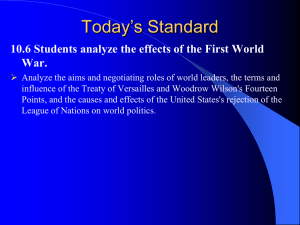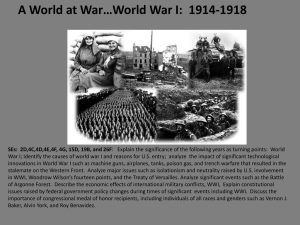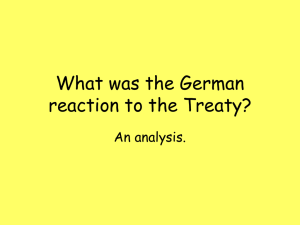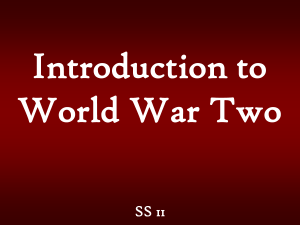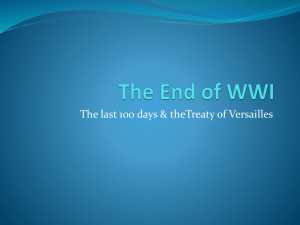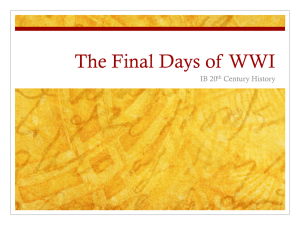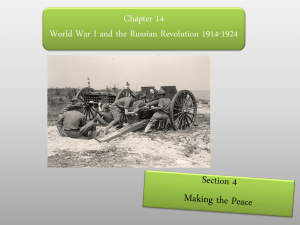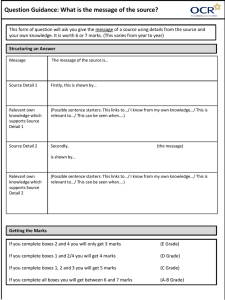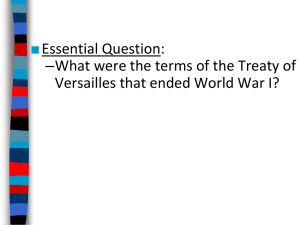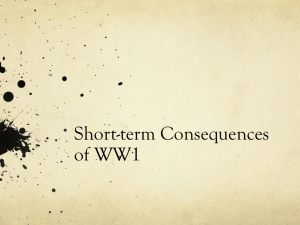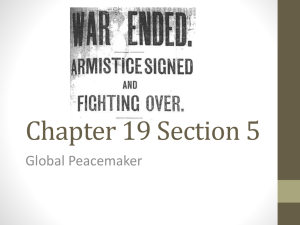IMPACT 2014
advertisement
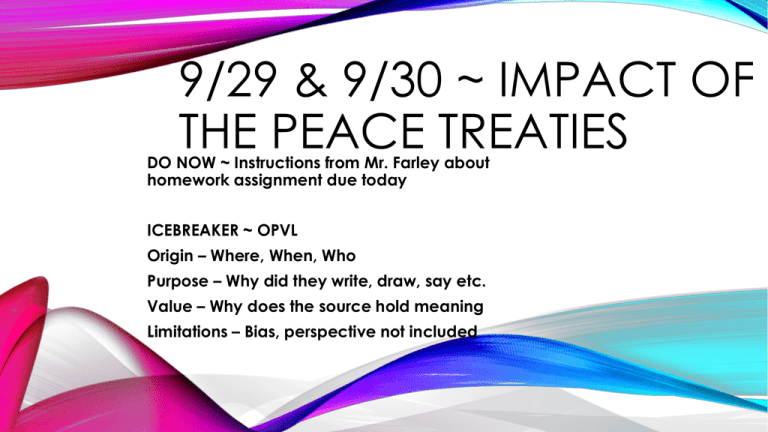
9/29 & 9/30 ~ IMPACT OF THE PEACE TREATIES DO NOW ~ Instructions from Mr. Farley about homework assignment due today ICEBREAKER ~ OPVL Origin – Where, When, Who Purpose – Why did they write, draw, say etc. Value – Why does the source hold meaning Limitations – Bias, perspective not included OPVL SOURCE A Extract from a speech by President Woodrow Wilson in Omaha, Nebraska, USA, 8 September 1919. For the first time in history the advisers of mankind are to be drawn together and concerted all over the world … Germany is for the time being left out because we did not think that Germany was ready to come in. She says that she made a mistake. We now want her to prove it by not making the same mistake again … When an individual has committed a criminal act, the punishment is hard, but the punishment is not unjust … Every great fighting nation in the world is on the list of those who are to constitute the League of Nations. I say every great nation, because America is going to be included among them, and the only choice my fellow citizens is whether we will go in now or come in later with Germany; whether we will go in as founders of this covenant of freedom or go in as those who are admitted after they have made a mistake and regretted it. OPVL Source A is originated from a speech given by President Woodrow Wilson in Omaha, Nebraska on September 8th 1919. The purpose of this speech is to speak about countries from all over the world joining the League of Nations. He is trying to persuade America that they must join the League now as a founding member because America is one of the strongest countries in the world. He does not want America to regret not joining the League of Nations. The value in this speech is that President Wilson is arguably in charge of the strongest country in the world coming out of WWI. He came up with the idea of the League of Nations in his Fourteen Points and if America does not join the League of Nations it will be a huge mistake. He believes it is evitable that America join the League and they will either enter as a founder or with Germany later on. This speech is limited because it not address the views of other countries joining the League of Nations. Wilson viewed the League as an opportunity for countries to be diplomatic. Where as France viewed the League as something only to be used in emergency situations and would serve as a military alliance. WHY DID GERMANY LOSE WW1? 1) Britain had blockaded Germany leading to shortages of food and fuel 2) Germany had overstretched themselves by taking over Russian territories 3) Britain and France were strengthened by their allies, the USA WHAT WERE THE EFFECTS OF THE TREATY OF VERSAILLES ON GERMANY? • 3 Groups – Brainstorm – 5 minutes 1. Which terms of the Treaty of Versailles would make Germans feel . . . A) Humiliated B) Angry C) Insecure Which parts of the Treaty of Versailles were most likely to cause problems for the Germany? IMPACT OF PEACE TREATIES • Overview: • Impact of treaties of central, eastern, & S. Europe created new states that were weak and politically unstable • Russian Civil War ~ stability in region (E. Europe) not possible • Balance of Power ~ Germany not in a bad position due to so many new countries • Economic problems faced by all nations • Mandate system established to administer the colonies • Mandate system allowed France and Britain to increase their influence throughout the world GERMAN LOSSES WERE HUGE: • 12% of the German population lost to other nations • 13% of German land gone • Food shortages due to Allied Naval Blockade • Biggest loss was the Alsace Lorraine • Land taken to create the Polish Corridor (land that gave Poland access to the sea) • Germans resented signing the Treaty of Versailles Found it hard to keep forces at 100,000 SOVIET REVISIONISM • Russia underwent a Soviet revolution and civil war • Poland taken out of Soviet land—created a buffer of new nations • Treaty of Rapallo (1922) meant to undermine the Treaty of Versailles. • Agreed to forgo claims against each other • German military allowed to practice military tactics with weapons forbidden by the Treaty of Versailles LITTLE ENTENTE • Little Entente-Alliance of Czechoslovakia, Yugoslavia and Romania • Military and economic cooperation • Supported by France • Poland would not join this b/c of hostility w/ Czechoslovakia • Angry over Teschen (mineral rich area claimed by both Poland and Czechoslovakia) MANDATE SYSTEM • Wilson called for self-determination Instead there was an “administration” over new colonies • 3 Levels • “A Mandates”-nations ready for independence quickly • Formerly controlled by the Ottoman Empire • “B Mandates”-less advance, not ready for independence— • Mostly in Africa, divided b/w Brits, French and the Belgium's • “C Mandates”-areas with low population, economically underdeveloped• Usually in the Pacific A - MANDATE B - MANDATE C- MANDATE GERMAN NEWSPAPER, 28TH JUNE 1919 ‘Vengeance! German nation! Today in the Hall of mirrors the disgraceful treaty is being signed. Do not forget it. The German people will with unceasing labour press forward to reconquer the place among nations to which it is entitled. Then will come vengeance for the shame of 1919’ What does this source tell us about how Germans felt about the Treaty? What does it tell us about what Germans wanted to do about the Treaty? CARTOON ANALYSIS • For cartoon analysis ask yourself the following: • Time – what time period is the cartoon from • Action – what is the “motion” happening • Caption – what is written outside the picture & within the picture • Objects – identify important objects that are critical to the meaning CLEMENCEAU THE VAMPIRE, 1919 What can you learn from this source about how Germans felt about the Treaty of Versailles? Level 1 – D - F Short sentence answer Simple observations – describes what can be seen Level 2 – C Longer sentences Describes what can be seen Can give a simple explanation of what the cartoon might mean Level 3 – B Long sentences, answer in a paragraph Describes what can be seen accurately Explains the overall meaning of the cartoon Addresses the question simply Level 4 – A Complex sentence, possibly more than 1 paragraph Describes the key features of the picture, explaining what each one represents and means Writes a conclusion that answers the question Analyse these 4 cartoons in your assigned groups EXTENSION – DESIGN YOUR OWN POLITICAL CARTOON! • Design your own cartoon about the Treaty of Versailles – Think! • Are you producing it from a British or German point of view? • How will you represent the different sides? • What will the title of your cartoon be? • What is the title? How will you use text? • You must include a TITLE, PICTURE, CAPTION, & SUMMARY of your cartoon • You must also include a OPVL analysis of your cartoon... • Design a OPVL analysis appropriate for your cartoon! EXIT CARD • Explain why Germany lost WWI. • In what ways was the Treaty of Versailles unfair? • What were the political, economic, and social consequences of the treaties following WWI?

